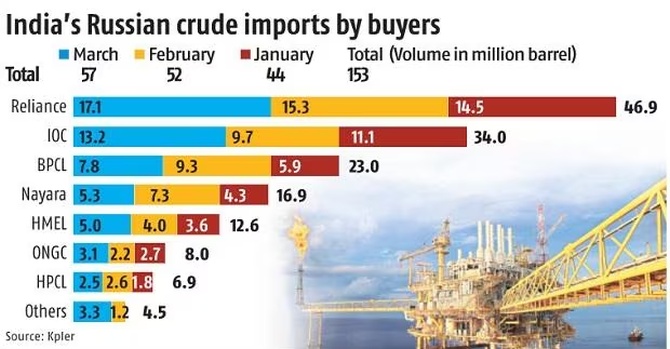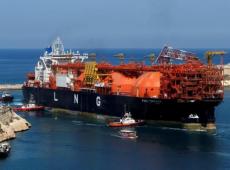India Exported $6.65 Billion Oil From Russian Crude to G7: Report
By Rediff Money Desk, NEWDELHI Feb 21, 2024 17:00
India exported over $6.65 billion worth of oil products derived from Russian crude to G7 nations, despite price caps, highlighting loopholes in sanctions.

Photograph: Issac Urrutia/Reuters
New Delhi, Feb 21 (PTI) Over one-third of India's export of oil products to the G7-led coalition countries was derived from Russian crude, a European think-tank said, highlighting how the partners shunned buying Russian crude and imposed price caps but a loose policy on refined product allowed third countries to use Russian oil and legally export products to them.
While there are no restriction or sanctions on buying/using Russian crude oil and exporting fuels such as diesel derived from it, the Group of Seven (G7) rich nations, the European Union and Australia - called the price cap coalition countries - first set a crude price cap of USD 60 per barrel starting December 5, 2022 and later on products like diesel to keep market supplied while limiting Moscow's revenue.
This was aimed at punishing Russia for its February 2022 invasion of Ukraine by depriving it of oil revenues while averting a surge in prices that could occur if Russian oil stopped flowing to global markets.
"In the 13 months since the oil price cap took effect (in December 2022), over one third of India's exports of oil products to sanctioning countries was derived from Russian crude (EUR 6.16 billion or USD 6.65 billion)," the Finland-based Centre for Research on Energy and clean Air (CREA) said in a report.
"A huge proportion of these exports came from the Jamnagar refinery," it said, alluding to the refinery operated by Reliance Industries Ltd in Gujarat.
Jamnagar alone exported EUR 5.2 billion of oil products produced from Russian crude to the price cap coalition, it added.
An email sent to Reliance for comments remained answered.
"India imported Russian crude worth EUR 3.04 billion to create these products for sanctioning countries," CREA said.
The USA imported EUR 1.2 billion of oil products from India, which were estimated as being refined from Russian crude. "India imported EUR 733 million of Russian crude to create these products for the USA."
The price cap coalition countries imported a further EUR 469 million worth of oil products from the Vadinar refinery, it said, alluding to the refinery operated by Nayara Energy in Gujarat. "Russian energy giant Rosneft - who are on OFAC's list of sanctioned entities - is its single largest shareholder with a 49.1 per cent share in the company."
The USA imported EUR 59 million of oil products from Vadinar starting from the introduction of the crude oil price cap until the end of December 2023.
According to CREA's estimate, 42 per cent of the refinery's feedstock is Russian crude.
While some western nations have since February 2022 shunned buying Russian oil directly, they however import petroleum products from China, India and Turkey that have emerged as major buyers of Russian crude oil.
Turkey's port of Aliaga (the location of the STAR refinery and Tupras Aliaga Izmir refinery), was the second highest exporting location of oil products made from Russian crude to the price cap coalition, it said.
"EUR 8.5 billion (USD 9.18 billion) of price cap coalition countries' imports of oil products between December 1, 2022 and December, 2023 were made from Russian crude. These imports in a 13 month period are equivalent to 68 per cent of the EU's annual commitment to aid Ukraine between 2024 and the end of 2027," CREA said.
In 2023, there was a 44 per cent year-on-year increase in sanctioning countries' imports of oil products, by volume, produced from Russian crude, it said, adding the price cap coalition's (PCC) imports of oil products made from Russian crude oil generated EUR 1.7 billion of tax revenues for the Kremlin from December 2022 to December 2023.
Since the introduction of the price cap till December 2023, the USA imported EUR 1.6 billion worth of oil products derived from Russian crude. EUR 807 million of Russian crude was used to make these products for the USA, it said, adding price cap coalition countries imported EUR 2.4 billion of diesel derived from Russian crude.
"Over one-third of sanctioning countries' imports of oil products from the eight major refineries identified as using Russian crude, consisted of diesel, worth EUR 7.4 billion. 76 per cent of this, worth EUR 5.7 billion, came from the Jamnagar refinery in India," it said.
According to CREA's estimates, EUR 1.88 billion of this diesel was derived from Russian crude.
"This lies upon the assumption that the diesel exported from this refinery is produced from the same proportion of Russian feedstock as for all other oil products. Relying upon a similar assumption, EUR 2.4 billion of diesel imported by the price cap coalition from these eight refineries is derived from Russian crude," it added.
The EU bars EU vessels as well as insurers from handling Russian-origin oil unless it is priced at or below the price cap.
While there are no restriction or sanctions on buying/using Russian crude oil and exporting fuels such as diesel derived from it, the Group of Seven (G7) rich nations, the European Union and Australia - called the price cap coalition countries - first set a crude price cap of USD 60 per barrel starting December 5, 2022 and later on products like diesel to keep market supplied while limiting Moscow's revenue.
This was aimed at punishing Russia for its February 2022 invasion of Ukraine by depriving it of oil revenues while averting a surge in prices that could occur if Russian oil stopped flowing to global markets.
"In the 13 months since the oil price cap took effect (in December 2022), over one third of India's exports of oil products to sanctioning countries was derived from Russian crude (EUR 6.16 billion or USD 6.65 billion)," the Finland-based Centre for Research on Energy and clean Air (CREA) said in a report.
"A huge proportion of these exports came from the Jamnagar refinery," it said, alluding to the refinery operated by Reliance Industries Ltd in Gujarat.
Jamnagar alone exported EUR 5.2 billion of oil products produced from Russian crude to the price cap coalition, it added.
An email sent to Reliance for comments remained answered.
"India imported Russian crude worth EUR 3.04 billion to create these products for sanctioning countries," CREA said.
The USA imported EUR 1.2 billion of oil products from India, which were estimated as being refined from Russian crude. "India imported EUR 733 million of Russian crude to create these products for the USA."
The price cap coalition countries imported a further EUR 469 million worth of oil products from the Vadinar refinery, it said, alluding to the refinery operated by Nayara Energy in Gujarat. "Russian energy giant Rosneft - who are on OFAC's list of sanctioned entities - is its single largest shareholder with a 49.1 per cent share in the company."
The USA imported EUR 59 million of oil products from Vadinar starting from the introduction of the crude oil price cap until the end of December 2023.
According to CREA's estimate, 42 per cent of the refinery's feedstock is Russian crude.
While some western nations have since February 2022 shunned buying Russian oil directly, they however import petroleum products from China, India and Turkey that have emerged as major buyers of Russian crude oil.
Turkey's port of Aliaga (the location of the STAR refinery and Tupras Aliaga Izmir refinery), was the second highest exporting location of oil products made from Russian crude to the price cap coalition, it said.
"EUR 8.5 billion (USD 9.18 billion) of price cap coalition countries' imports of oil products between December 1, 2022 and December, 2023 were made from Russian crude. These imports in a 13 month period are equivalent to 68 per cent of the EU's annual commitment to aid Ukraine between 2024 and the end of 2027," CREA said.
In 2023, there was a 44 per cent year-on-year increase in sanctioning countries' imports of oil products, by volume, produced from Russian crude, it said, adding the price cap coalition's (PCC) imports of oil products made from Russian crude oil generated EUR 1.7 billion of tax revenues for the Kremlin from December 2022 to December 2023.
Since the introduction of the price cap till December 2023, the USA imported EUR 1.6 billion worth of oil products derived from Russian crude. EUR 807 million of Russian crude was used to make these products for the USA, it said, adding price cap coalition countries imported EUR 2.4 billion of diesel derived from Russian crude.
"Over one-third of sanctioning countries' imports of oil products from the eight major refineries identified as using Russian crude, consisted of diesel, worth EUR 7.4 billion. 76 per cent of this, worth EUR 5.7 billion, came from the Jamnagar refinery in India," it said.
According to CREA's estimates, EUR 1.88 billion of this diesel was derived from Russian crude.
"This lies upon the assumption that the diesel exported from this refinery is produced from the same proportion of Russian feedstock as for all other oil products. Relying upon a similar assumption, EUR 2.4 billion of diesel imported by the price cap coalition from these eight refineries is derived from Russian crude," it added.
The EU bars EU vessels as well as insurers from handling Russian-origin oil unless it is priced at or below the price cap.
Read More On:
DISCLAIMER - This article is from a syndicated feed. The original source is responsible for accuracy, views & content ownership. Views expressed may not reflect those of rediff.com India Limited.
You May Like To Read
TODAY'S MOST TRADED COMPANIES
- Company Name
- Price
- Volume
- GTL Infrastructure
- 2.93 ( -4.87)
- 226206286
- IFL Enterprises
- 1.30 (+ 4.84)
- 81461564
- Vodafone Idea L
- 16.79 (+ 0.66)
- 67447398
- NCL Research
- 0.95 ( -4.04)
- 31996628
- Franklin Industries
- 3.73 (+ 3.32)
- 21511209
MORE NEWS

Navi Mumbai Airport ILS Signal Testing Begins
The Airports Authority of India (AAI) has begun ILS signal testing at the...

Air India VRS for Non-Flying Staff Ahead of...
Air India has announced a voluntary retirement scheme (VRS) and voluntary separation...
Fisher Groups Oppose WTO Fisheries Subsidy Talks
Small-scale fisher groups from India, Indonesia, and Bangladesh demand WTO keep...












 © 2024 Rediff.com India Limited. All rights reserved.
© 2024 Rediff.com India Limited. All rights reserved.